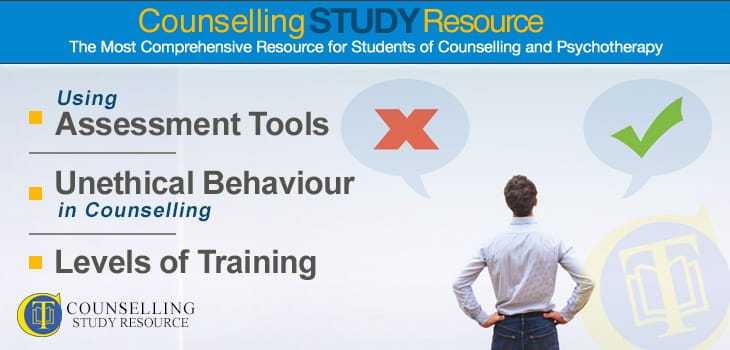106 – Unethical Behaviour in Counselling
Using Assessment Tools in Counselling – Levels of Training
In episode 106 of the Counselling Tutor Podcast, Ken Kelly and Rory Lees-Oakes discuss the use of assessment tools in counselling. In ‘Practice Matters’, Rory then looks at the various forms of unethical behaviour in counselling. Finally, the presenters talk about the different levels of counselling training, and how to choose which level is right for you.
All three topics follow questions asked in our Facebook group (where you’ll find over 22,000 others involved in counselling and psychotherapy, including students, qualified counsellors, supervisors and tutors).
Using Assessment Tools in Counselling (starts at 2.53 mins)
Most assessment tools used in counselling take the form of questionnaires. Common ones that you might come across include GAD-7, PHQ-9 and CORE-10.
Although it can jar for students of person-centred counselling to be asked to use such tools, this generally is done before and after the counselling itself.
The purpose of the questionnaires is often to provide evidence of the impact of counselling: this is important to organisations seeking to source funding for their work.
Assessment tools may also be of benefit to clients, who may feel encouraged by an improvement in their score. They also provide good quantitative data for research studies.
Unethical Behaviour in Counselling (starts at 14.08 mins)
Rory looks at typical areas for clients to complain to professional bodies in the field of counselling and psychotherapy (e.g. the British Association for Counselling and Psychotherapy and the National Counselling Society) that their therapist has acted unethically – either in person or online.
It’s good to be aware of these key risk areas, in order to help prevent incurring any complaints from clients – and the resultant sanctions from your professional body.
While some forms of unethical behaviour in counselling may seem obvious, others are less so. It’s always better to be proactive in avoiding difficulties than it is to react to these after they have occurred.
Levels of Training (starts at 30.16 mins)
It can be frustrating for people who already have higher-level qualifications to start their counselling training at level 2 – but in fact there are many advantages to doing so.
Whereas in some other subject areas, prior learning can be accredited so that you might skip some parts of a course, counselling is a unique field in that personal development is such an important part of the training.
Counselling theory does relate to personal development – indeed, Rory has recently delivered a lecture in the CSR about linking the two – but a theoretical knowledge alone is not sufficient to make someone an effective and ethical counsellor.
Another advantage of starting at level 2 is that it gives you an insight into whether counselling really is for you before committing a lot more time and money to your training. Rory mentions that he has known people who have been convinced they want to be counsellors until they did this introductory course.
Other students decide to stop after level 3 – their certificate in counselling skills. Although you can’t practise as a counsellor at this level, the qualification is well regarded by employers in many areas of helping work, e.g. education and health/social care.
If you do decide to continue towards the qualification level (currently a minimum of level 4 in the UK), placement providers often expect students to have completed the lower-level stages of counselling training too. Students will typically start their placements in the second year of the diploma training.


